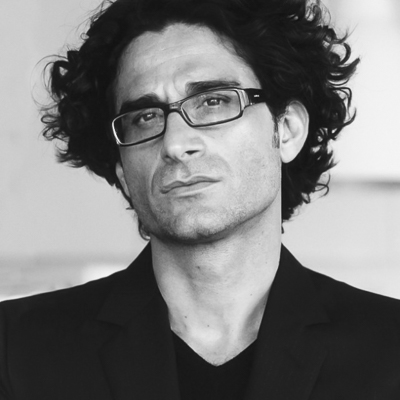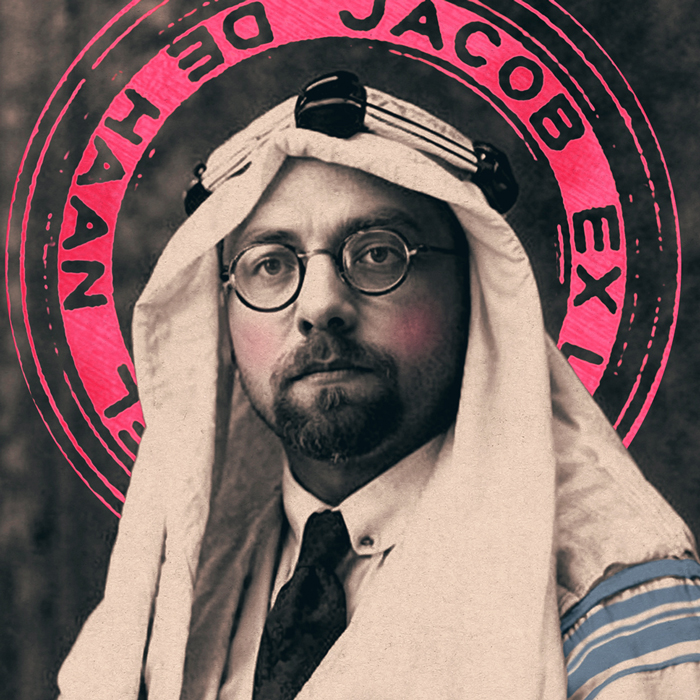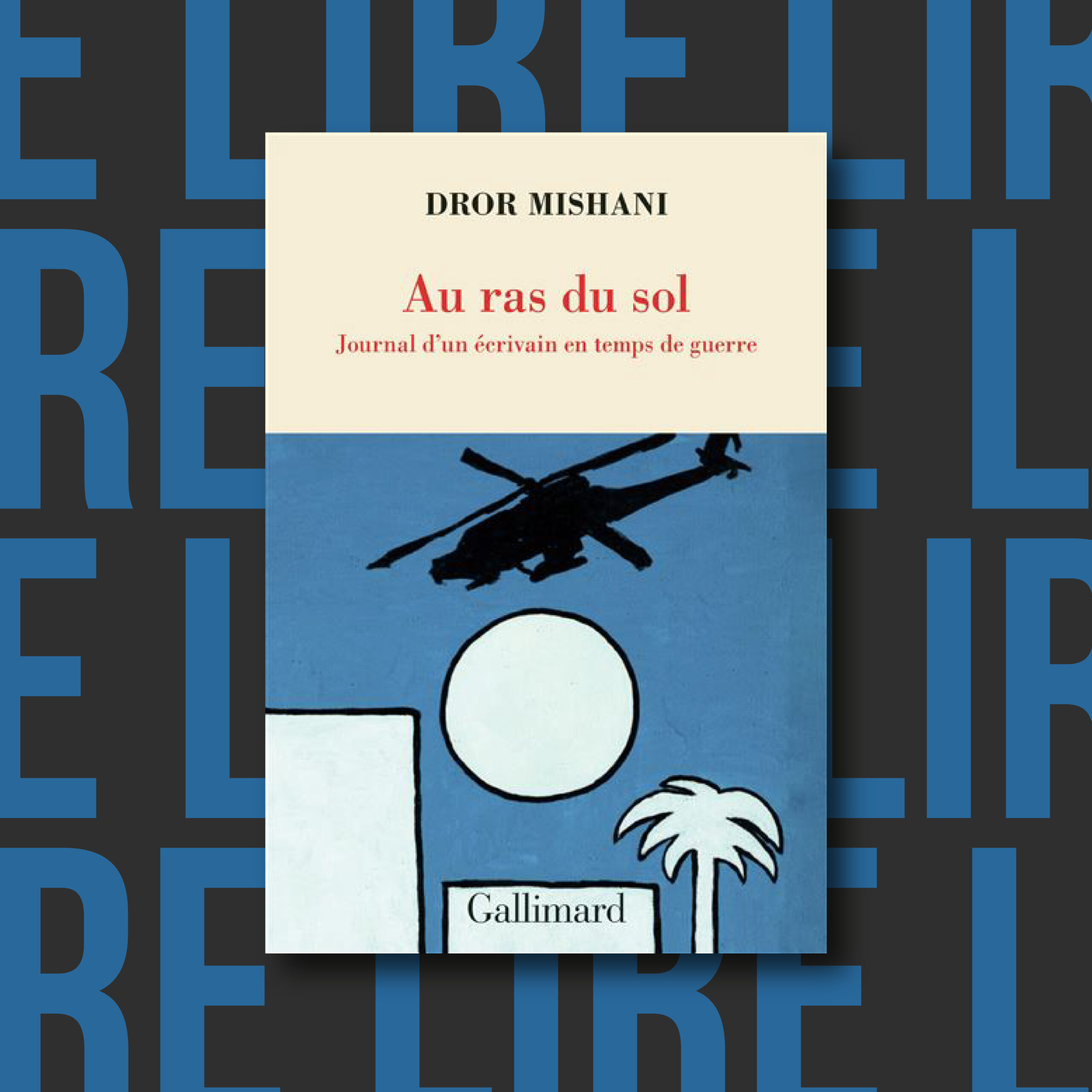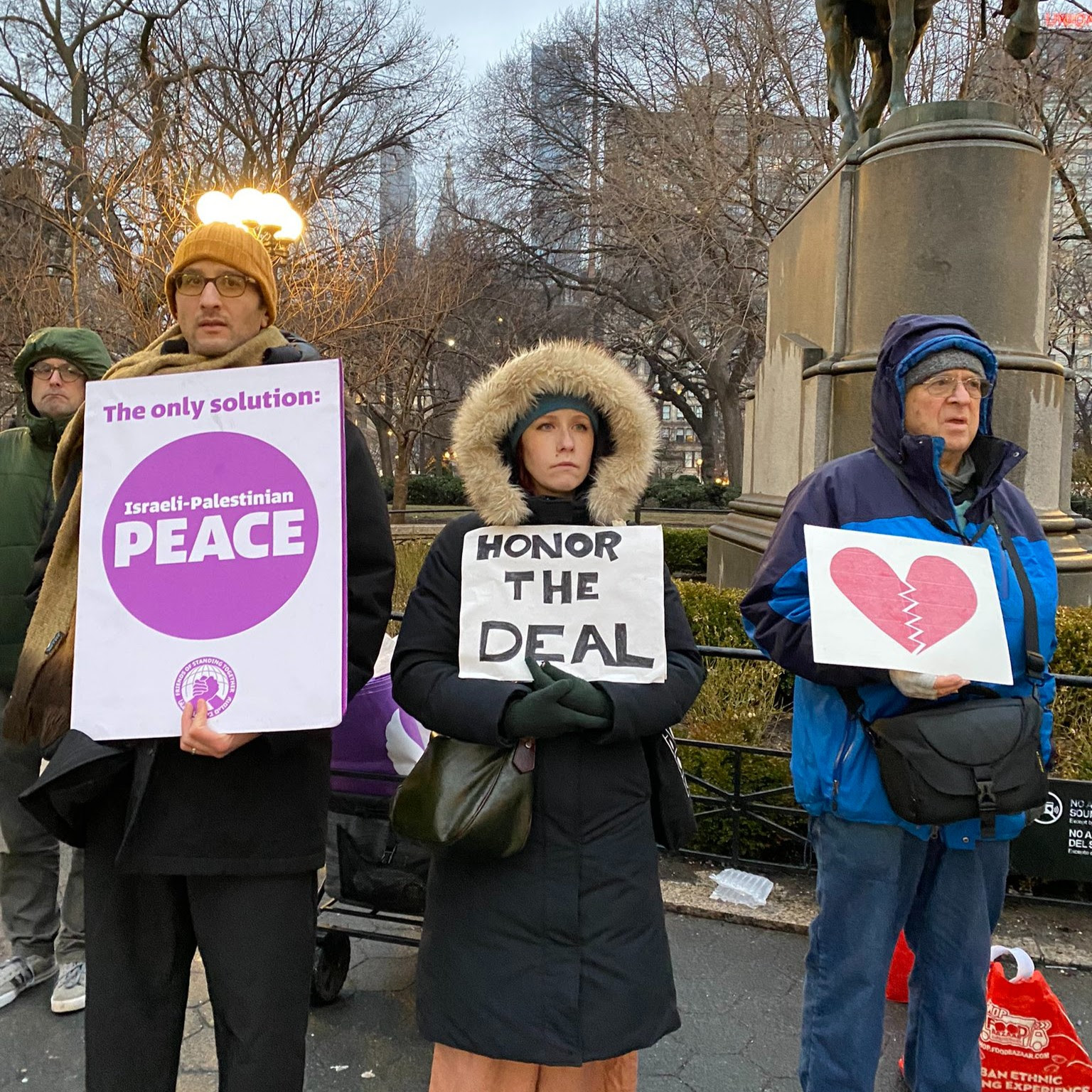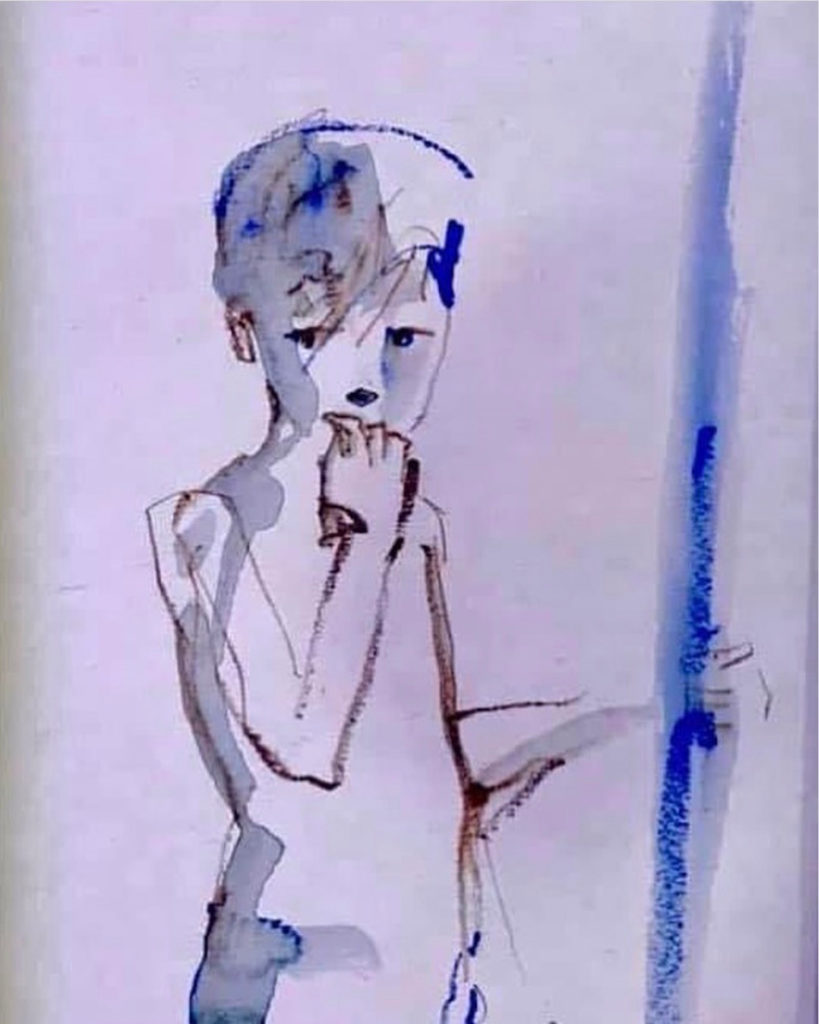
The title of this artwork in English is « There is no Magen David », which may be understood as « There is no protection ».
Lire cet article en français - Read this article in French
I’d been speechless since the 7th of October.
It was a source of constant amazement – I just couldn’t get used to it – seeing and hearing all these “people in the know” wanting to explain to us who was “truly” responsible for what had just happened. And it was just as amazing to see so many of them rushing around to offer their ready‐made version of the events. Talking to the press in their confident and definitive voice ; providing their personal “reasons for the current crisis” (turns out that this was just one of many other small crises they’d faced); portraying the whole situation as a “legitimate civil uprising”; and happily informing us that “the Israeli occupation” is “the cause of all horrors”. Then there was the Secretary‐General of the United Nations, the good old UN : “The attack on Israel didn’t happen in a vacuum”. Of course, reducing something to a mere “attack” means it ought to be contextualised, now and forever. All these people in the know. Who have never had any second thoughts ? Not to mention all those going on‐line to spread a poison that would then be relayed at dizzying speed by the zealots following them. Pushing the view that Hamas had been pushed to the limit. That its response was understandable…
Now I’m starting to find my voice again – but still don’t want to get involved in geopolitics. I’m just not up to it at the moment, despite the fact that I actually possess real historical expertise, having possibly read everything that both sides have had to say on the topic. What I want is to find is another way of speaking, trying something out of the ordinary. Which doesn’t involve making any speeches. We’ll leave that to the petition signatories.
We Israelis have just experienced a mass murder, a genocide, an act of ethnic cleansing. It’s strange that no one has been talking about that. 1,400 people murdered. Babies, children, women, men, old people.
It took eight hours. A paltry eight hours.
That’s what happens when Israel fails to defend itself for eight hours. A pogrom. They raped, they tortured, they gouged out victims’ eyes, they humiliated, burned, beheaded and killed human beings. House by house by house. Village by village. And then they rang their parents to brag about it. If we are incapable of distinguishing a defensive military operation from a pogrom and attempted genocide, then we have no basis for further discussion, be it rational or emotional. Hamas foresaw and even pre‐planned this defensive military operation. It’s long been trying to drag the State of Israel down into the abyss – and has largely succeeded in doing so.
The solitude of Israel – and of Israelis – is a very real thing. As is the solitude (albeit on a lesser scale) of an Israeli living in the West. From now on, however, there is also the solitude that Jews feel everywhere, especially when they live in a “intellectual left‐wing” circle.
Western democracies’ military and symbolic support for Israel – motivated by reasons that often transcend both the country and its raison d’être – has no effect on the equation. That’s because another kind of international support system – a military, humanitarian and symbolic one – actually exists. It’s the one being used today to defend the Palestinians’ “right” and desire to put Israel’s very existence in doubt – even though it’s never been deployed for anyone else in the world (and certainly not for the Armenians, Yazidis, Kurds or Tibetans).
The State of Israel is supported by Western regimes. According to the Western far left, this suffices and of itself to exclude Israel from the rest of humanity. Raising in turn a question as to which if any other nation in the world – and/or which people in the world – is being excluded from humanity simply because the Western alliance supports its right to exist and defend itself.
The purpose of “contextualising terrorism” and creating a hierarchy of victimhood
It’s staggering to discover some of the statements that Étienne Balibar or Frédéric Lordon have made – including the latter philosopher’s description of France as “totalitarian” regime. There is a stunning absence of political nuance in the words being deployed by a scholar pretending to describe the current crisis. This being the same Balibar who had evoked the “necessary contextualization of terrorism”[1] to justify the killing of David Gritz, a young French philosopher who had gone to Israel to study philosophy and was instead murdered by Hamas during its 2002 Mount Scopus attack.
Slavoj Žižek and Judith Butler have been quick off the mark to say, “What happened on 7 October is certainly ‘unjustifiable’ but it is understandable”. My response to them is “Enough already with this desire for understanding”. Not everything can be deciphered using the construct of “understanding”. “Understanding the Other” to the point of rationalising their barbarity is tantamount to justifying barbarism.
When discussing the situation, the only thing these “great philosophers” can ever talk about is their supposedly nonexculpatory (yet oddly rationalised) understanding of crimes that are completely unjustifiable. It’s as if ethicality and responsibility are systematically contingent on a given form of understanding. Unjustifiability may be asserted with great pomp and ceremony but it is quickly followed by a stereotypical framing where everyone is seen through the customary filters of the oppressor vs. the oppressed, the executioner vs. the victim. It’s an easy way to gloss over an act they had just called “unjustifiable”. Hence the imperative, once their theory threatens to slip through their fingers, that this act be justified at all costs. After all, by so doing they will be able to maintain their anti‐Zionism posture and, above all, an objective alliance with bloodthirsty terrorists.
Their whole system is falling apart.
A petition that has been widely signed in the world of art[2] (and which refers to Israel as a colonial phenomenon) has just been published without a single mention of the casualties Israeli incurred on 7 October.
I am acquainted with some of the petition’s signatories and have discussed the issues with several others. They possess basically zero knowledge of the region’s history. Let me repeat that. However problematic it is to describe the “world of art” thusly, few if any sections of society are comprised of people with such an astonishingly impoverished political culture. As for their theological culture, it’s laughable. The relationship they’ve manufactured with the Arab or Jewish Orient is rooted in fantasy and feelings of guilt that vary from one instance to another. Their political awareness goes no further than pure rhetoric, often couched in a hopelessly simplistic notion of post‐colonialism. Moreover, they are completely lacking in sensitivity where the Jewish question is concerned. For them, Jews are always strong, rich and powerful allies of the West, the latter being a world they also abhor. Jews have the inconvenient habit of always wanting to “be”; to reinvent their existence.
Jews are never vulnerable, fragile, exposed – the hackneyed, threadbare terms these truth Sayers use on a daily basis when referring to victims (i.e. to the poor, the excluded, the dominated, the humiliated) but never when referring to Jews, especially Israeli Jews.
These voices of outrage are always quick to raise the spectre of “Israeli colonisation.” Not policies, not solutions, not whatever is arising on the political horizon. Nor do they direct much criticism at the governments or the political cowardice of which both sides are guilty. Their goal from the very outset is to condemn a historical fact – notwithstanding the impossibility of its being reversed today. And so they keep talking about the “colonisation” of “Palestine”. Despite the fact that before 1948, no such entity had ever been identified or defined. Despite the fact that the “Palestine” of 1967 was never fully analysed. Their famous contextualisation ? It’s never been applied to Palestinian political leadership ; to all the things for which Arafat’s PLO was responsible ; or to the Arabs’ 1974 Rejection Front.
In this narrative, Jews popped up out of the blue, came out of nowhere, intent on monopolising things that did not belong to them. The same voices who otherwise claim that “land doesn’t belong to anyone” are now insisting stridently that in the case of this one people, the Palestinians, “it does belong to someone”– an equation that, of course, completely excludes anyone who is Jewish.
Because in their eyes, the State of Israel has no right to exist.
Spare me their convenient fantasy of the wandering Jew, the exile, the nomad, who has no country to call home. I’m far too familiar with their narrative describing Israel as an “anomaly”, one episode in Judaism’s structurally ordained exile. It’s a view I deem easily as stupid as Jewish nationalism and identitarianism. I also reject their post‐colonialist paradigm, one that supposedly applies universally, including as regards Jews’ relationship to the land of Israel. It puts liberal Jews in an untenable position. Who in their right mind would ever want to glorify colonialism and the unacceptable and intolerable injustices meted out by the West ?
Not I, for one. But I also do not accept this framing as an accurate characterisation of Israel.
What’s the point of thinking if thought is constrained by a completely pre‐determined framework ? Why can’t we be allowed, just for once, to judge and assess Israel and Palestine’s joint history in light of its unprecedented singularity ? Are intellectuals condemned to always roll out the same old ready‐made ideas, projecting their pre‐defined analytical matrices onto a situation that is both complex and unique ? Israel is also a post‐colonial product, a breakaway from at least part of Western colonialist history. The Jews were refugees who should be construed as such whenever their historic movements and displacements are examined. Do people really need reminding that in almost all of the Eastern European and Arab countries where Jews lived, they were always refugees, foreigners and/or outsiders ? And that in those Western Europe societies where they did integrate, this tended to only last for a short while ?
Some seem to imagine that we Israelis come from all sorts of places “other” than Israel, like Poland or Algeria or Tunisia. What do you think the likelihood is of our ever emigrating to any of those countries ? Do you really believe that we “belong” to them ? That things are that simple ? That Poland, Algeria and all the other countries who have seen Jews from all over the world pass through their gates view us as equals ? As bona fide members of society ?
Jews’ emancipation through Zionism occurred just as colonialism was starting to collapse – with the subsequent transition to decolonisation then taking a good while to materialise. Israel’s very creation, endorsed by the international community, materialised in opposition to the great colonial power of the time, England.
Zionism is not a colonial phenomenon. I, for instance, am both Israeli and a Zionist yet have always fought against certain Israeli colonial phenomena derived from Zionism. Do people really need reminding that several types of Zionism exist ? There are obviously a number of colonial phenomena happening in Israel – but it would be very wrong to reduce Israel to that and only that.
All of the left‐wing/liberal Israelis that I hang out or work with would always refuse to listen whenever their elders told them that, “The whole world is anti‐Semitic.” Today, these same Israelis are both anguished and nerve‐wracked to discover that the people opposing Israelis’ right to live on their ancestral lands are the very same ones who were supposed to have once been their closest “humanist” allies, comrades with whom they had fought so many battles, struggling for minority rights, for the rights of the disadvantaged, for a people’s right not to be blamed for its government’s misdeeds – or not to be blithely conflated with the religious and/or other identity groups where it originated. All Israeli Jews ever wanted was to find shelter in a world where they have long faced extreme levels of hostility, possibly more than anyone else has done. Which is not to say that other peoples – including the Palestinians – have not suffered in the past or aren’t in the present. It is a battle that I wage each and every day together with my Israeli and Zionist friends. There needs to be recognition of the fact that the Jewish reality often provokes irrational responses and visceral opposition. Moreover, this doesn’t only come from Westerners with an originally non‐Western ethnicity who feel a sense of solidarity with the Palestinians. That’s something they obviously have a right to do. Indeed, it’s a feeling that I not only respect but also understand and even share. Notwithstanding that it adds to the trauma which Israelis already feel.
People are so quick to forget.
They are so quick to forget the history of Israel and Palestine, the history of Europe, the history of Jews.
How did we get here ? How did so many global progressives come to believe that Israel poses a threat to the world ? How is it that so many intellectuals think they have the right to say whatever crosses their mind regarding a topic about which they know so little – even if by so doing they are endangering the lives of Israelis and anyone else who stands with them, starting with many if not most Jews worldwide. It’s unbelievably irresponsible.
It’s clear as daylight that the trigger for all this has been the progressive demonisation and dehumanisation of Israel and Israelis. A dehumanisation that doesn’t weigh as systematically or obsessively on the terrorist groups which have been engaging in pogroms since long before the birth of Israel, even as these groups claim to represent the Palestinian people – to whom, I deeply regret, they also do enormous harm.
On top of which, the very same intellectual circles have now started berating us because we’re supposedly supported by “the European right and far right”.
Shouldn’t Israel have the right to survive even if it gets zero support from the European right and far right ? What about the support we get from America ? Do you think us so naïve as to not notice to what extent we are being instrumentalised by the far right, by American evangelicals[3] and by other such interested parties ?
There is an Israel that has the right to exist irrespective of who it’s getting support from, indeed, without such support and even against it.
I’m old enough to remember the way my country was in the 1970s.
The old Holocaust survivors who lived together, without children, who came “from over there”, as people used to say. From hell.
Those who lived without living.
The ones who were never able to rebuild a normal life, a family life, the ones who just carried on, living amongst themselves. My father used to tell me, “Be nice to them.”
I’m old enough to remember all the “madmen” who had – quite understandably – lost their minds. Who had once been subjected to Mengele’s treatments, elderly men with women’s breasts, sitting on the beach and scratching out a living reading kids’ fortunes.
I would like to point out that far too many Jews simply had nowhere to go, no place to land after the Holocaust.
Israel alone welcomed them. And they weren’t all Zionists.
Ah, that word, Zionism. Let’s talk about it.
To start out, it’s the most abused word (and ideology) of our time. Can you imagine what it’s like for me – a highly politicised Israeli, extremely critical of the current government (and a few others before), deeply mobilised in a slew of protest movements ever since the tender age of nine months old – what it’s like for me to be lectured day in day out by callow French, Quebec, Australian or Argentinian twenty‐year‐olds explaining to me why I am a mere settler in Israel, why my country doesn’t have the right to exist and why it has only survived through dispossession and injustice.
This they say to me, someone who has been more than critical of Netanyahu, whom I view as the great falsifier of Zionism and indeed destroyer of the Zionist project, as the politician who has divided Israeli society as never before and who has ultimately undermined its armed forces’ ability to defend the nation. Me, someone terrified by religious Zionism, which I deem guilty of having ravaged true Zionism’s emancipatory ideal – and indeed, of having hijacked Judaism itself. I am absolutely stunned by these voices lecturing me, explaining to me what Zionism really is and what I should think about Israeli politics and the “origins” of the country’s foundation. The alliance between Netanyahu and religious Zionism, with their shared fantasy of appropriating land that also belongs to the Palestinians, bears enormous responsibility for the events of 7 October. There are no excuses for this government’s murderous indifference to both the Palestinian question and the suffering of the Palestinian people. Everyone in Israel knows, now more than ever, that Netanyahu helped fund Hamas in order to neutralise the PLO.
Our future depends on both peoples, Israelis and Palestinians alike.
I cry for innocent Palestinians, I cry for Gazans huddling under the bombs.
We Israelis know what it’s like to experience fear and loss.
We Israelis – unlike the Western signatories of these endless anti‐ Israeli petitions – we know in our bones what it really means to die in (and through) unspeakable terror and indiscriminate massacres. We know what it’s like to have no way out and no one to talk to.
Yet you now allow yourselves to remind us that we have to avoid killing and victimising Palestinians. Tell me first – who is it among us who actually wants any deaths ? Who wants innocent Gazans to die ?
You must know that I detest those Israelis who want the Palestinians expelled and who persecute them each and every day.
Many of us fight back against their intolerable acts. We not only try to stop them but also to get them prosecuted.
Towards that end, we need the solidarity of all our left‐leaning and liberal friends. We need them fighting alongside of us. It’s the only way to give these dispossessed Palestinians what they deserve.
The global left’s abandonment of liberal Israel’s fight to achieve peace and render justice is deeply etched into our consciousness now. This isn’t a game for us.
The egotism of Western intellectuals and artists – of those subsections of the left‐wing intelligentsia who dispute Israel’s right to exist and defend itself – has increased the threat of death that Jews face worldwide. Their egotism is killing us.
Do you have any idea of what it means for Israeli Jews when the global left starts chanting, “From the river to the sea, Palestine will be free”? Do you understand the kind of humanitarian catastrophe that you’re advocating ? Is there no other way for our two peoples to coexist in peace ?
Doesn’t the Western left – the one that supports Hamas Palestinians and the Iranian regime – know anything about Hamas’ endless provocations ? Don’t you realise that it is an organisation which does not seek peace but wants instead to destroy Israel ?
Israel’s purpose in exiting Gaza in 2005 was to achieve peace with Gazans – it was supposed to be the start of a process. What remains of that process today, asides from despair of those who had supported and believed in it ? By conflating Hamas with all Palestinians, does this one sub‐section of the global far left not realise the damage it is doing to the Palestinian struggle ?
The two follies we face today – on the far left and on the evangelical/millennial far right – are translating into two separate nightmares. The way things are happening, it is the extremists who are getting what they always wanted and fantasized about : an ideological Gog and Magog for some ; a theological Gog and Magog for others. Israelis and Palestinians : two traumas that collide.
We need to do a better job at organising the divide between two peoples, both of whom must be able to find a way of living in this disputed land.
We owe it to the victims of 7 October and to their memory. We have a responsibility towards those Israelis and Palestinians who must now rebuild their lives in the knowledge both that their loved ones have died and that the immense pain with which they are now scarred will never go away. We also have a responsibility towards the children who have yet to be born, future generations who will have to live in our two ravaged countries. I have no real interest in reconciliation per se, if only because it’s a sentimental and politically vacuous gesture. Instead, what I believe is that responsibility – to be understood as full‐throated ethical and political commitment – will be the key to our carrying on in spite of everything.
Translated from French by Tsivia Frank Wygoda and Alan Sitkin
Raphael Zagury-Orly is an Israeli philosopher and the author of Le dernier des sionistes (“The last of the Zionists”) (Les Liens qui Libèrent, 2021).
1. Read about it in Catherine Chalier’s article Aveuglement (“Blindness”), Le Monde, 25 August 2002 – Back to text
2. Read about it in 'Les deux devraient aller de pair': l'appel des artistes israéliens, (““Both Should Come Together’: An appeal from Israeli artists”) on the Tenou’a website – Back to text
3. Read about it in Antoine Strobel-Dahan’s article Drôle d'amour (“A funny kind of love”), Tenou’a issue no170 – Back to text
